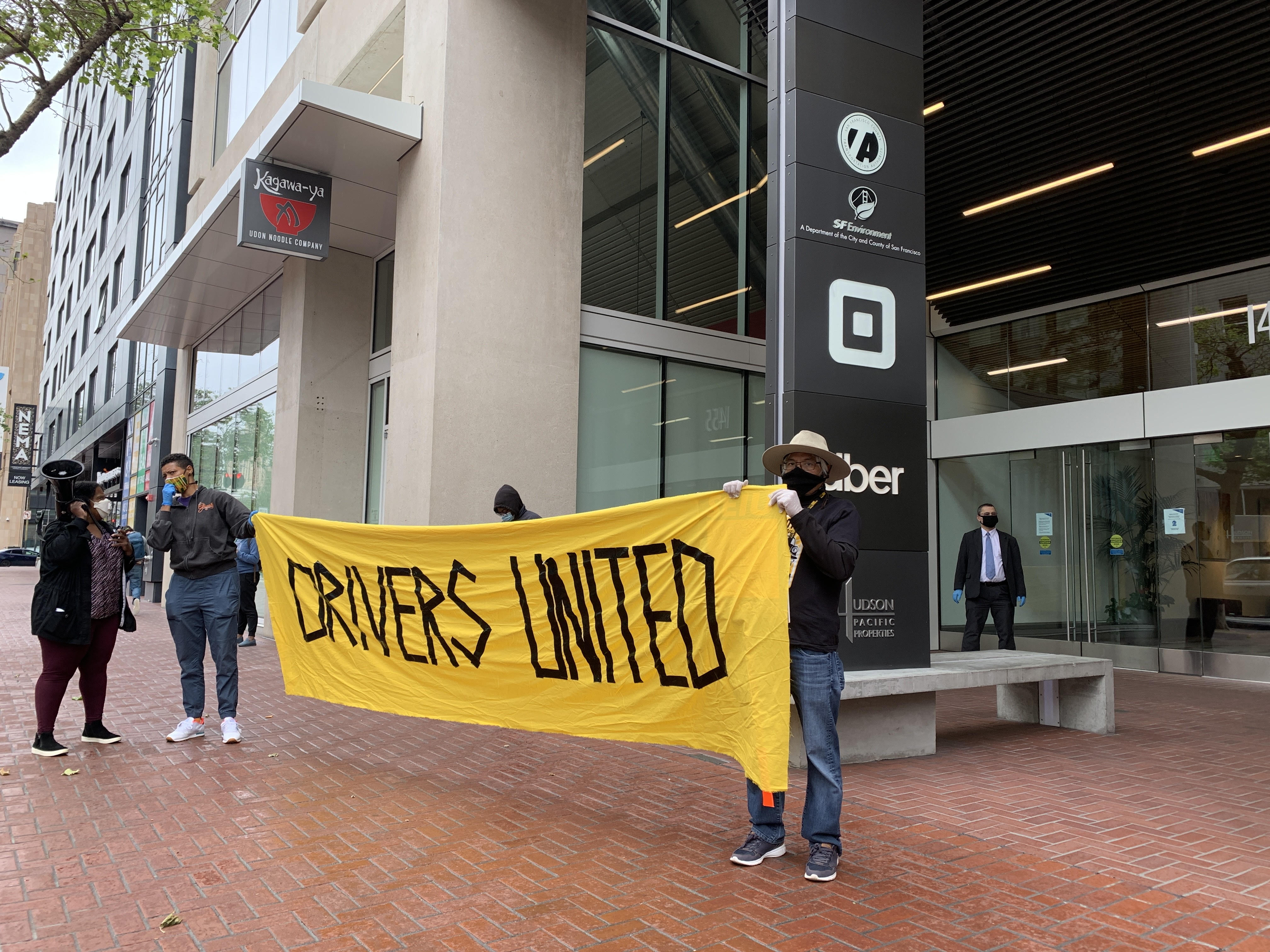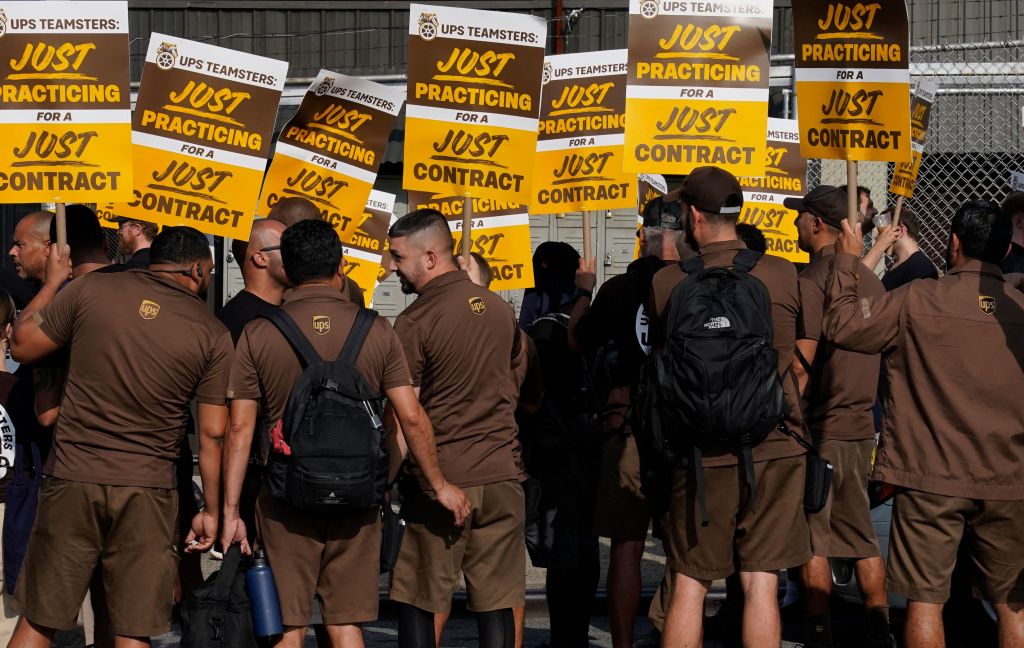One year after drivers went on a global strike to protest Uber the day it went public—drivers led a caravan protest on Monday to its San Francisco headquarters to demand it comply with Assembly Bill 5, the California law that has reclassified drivers and other “gig workers as employees instead of independent contractors.
Dozens of drivers joined the caravan—organized by We Drive Progress and Gig Workers Rising—two advocacy groups for app-based workers based in California—which began at 840 Brannan Street in San Francisco and ended at Uber’s HQ at 1455 Market Street.
Videos by VICE
Drivers that joined the protest caravan also demanded Uber pay into the state’s unemployment insurance fund and to drop a ballot initiative seeking to overturn AB5.

Misclassification is a key part of Uber’s elusive path to profitability as the strategy minimizes labor costs and liabilities by increasingly shifting its burden onto workers and taxpayers. This strategy allows Uber and Lyft to dodge paying $413 million in unemployment taxes to California and another $630 million in California wage claims. Uber owes another $650 million to New Jersey in unemployment insurance and disability taxes, along with interest payments on the dodged taxes. These violations of labor law have prompted California’s Attorney General, along with a coalition of city attorneys, to file a lawsuit against Uber and Lyft for willful misclassification of their drivers.
“If I went to Lyft or Uber and robbed their offices, I am sure I would be harshly punished. When Uber and Lyft effectively rob me of the fruit of my labor, I expect the response to be the same,” Edan Alva, an organizer with Gig Workers Rising told Motherboard. “In fact, I’m excited that the California Attorney General agrees with me and that their ongoing wage theft is going to court.”
The ballot initiative to overturn AB5 was organized by Uber, Lyft, and DoorDash—each contributing $30 million—then joined by Instacart and Postmates who added $10 million each. Uber maintains that this proposal would replace AB5 with a measure increasing hourly driver pay to $15.60 (California’s minimum wage is $13 for an employer with 26 or more employees.), but the UC Berkeley Labor Center found that the measure would actually reduce driver hourly earnings to $5.64 in California, even lower than the sub-minimum wages that force some drivers to sleep in their cars.

“Even though we’ve seen driver mobilization increase month over month, we’ve seen the companies respond in a negative fashion to driver demands,” said Steve Smith, a spokesman for the California Labor Federation. “They’ve actually gone in the opposite direction by limiting driver pay, breaking the law by misclassifying drivers, and really insisting that they don’t deserve basic worker rights.”
Hector Castalleanos, a We Drive Progress organizer who helped plan the caravan, told Motherboard that he’s fighting to make sure no driver is treated the way he’s been treated after an accident left him unable to drive for Lyft in 2017.
“I received no support from Lyft, nothing,” he said. “I did receive bills for everything else, however, and it was only because my daughter dropped out of school and started working full-time that our family was able to keep our home. I don’t want other drivers to suffer like I suffered, that was one of the worst moments of my life.”
Alva echoed the same concerns as Castalleanos:
“I’ve seen too many drivers end up without homes, sleeping in their cars, get sick and despite promises fail to receive any assistance,” he said. “It’s horrible when every cent you work for—every day—goes to existing. To rent, to car payments, to bills, to food. What happens when you get sick? You have to keep working, I’ve had to keep working. And even if we choose to stay home and recover, who can afford a doctor’s visit with this job? That’s what these companies have chosen to spend millions defending.”

The coronavirus has been especially devastating for both app-based workers and their employers. According to one survey by Jobs with Justice and UC Santa Cruz, drivers have lost anywhere from 75 to 100 percent of their income. Uber, which has never earned a quarterly profit, reported in a May 7 earnings call one of its largest deficits thus far—a staggering $2.9 billion, bringing its total losses close to $25 billion over the past decade. Lyft, which has also never posted a profit, reported a significant decline in ride-hail demand and nearly $400 million in losses as a result.
“Still, there is a path forward for them to both do right by their drivers and to continue the services they do, it’s just that they don’t want to,” Smith added. “They want to nickel and dime drivers in every which way to pad the profits of this company and allow for this unrealistic global expansion plan that they have. They just don’t take into account the well-being of those who earn the profits for them. This is their philosophy: get everything you can out of the workforce for the least amount of money possible; pad the bottom line of the company and its executives. The only way that changes is when workers demand more collectively. And that’s what we’re seeing.”




